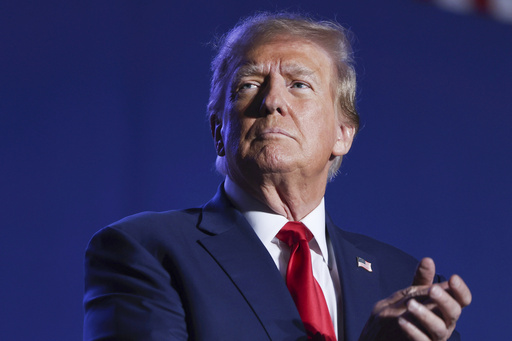
FILE PHOTO: Former President Donald Trump speaks at a campaign rally, Saturday, Dec. 16, 2023, in Durham, N.H. Trump is facing criticism for repeatedly harnessing rhetoric once used by Adolf Hitler to argue that immigrants entering the U.S. illegally are “poisoning the blood of our country. Trump insists he had no idea that one of the world’s most reviled and infamous figures once used similar words. (AP Photo/Reba Saldanha, File)
WASHINGTON — Donald Trump on Tuesday appealed a decision from Maine’s top election official disqualifying him from the state’s Republican presidential primary ballot next year over his role in the Jan. 6, 2021, attack on the U.S. Capitol, a court filing showed.
Trump, the frontrunner for the Republican nomination for November’s U.S. presidential election, asked a state Superior Court to reverse a decision from Secretary of State Shenna Bellows barring Trump from the March 5 primary ballot.
Bellows, a Democrat, concluded that Trump incited an insurrection in an attempt to hold onto power following his defeat in the 2020 election and was disqualified from holding office again under the U.S. Constitution.
READ: American democracy faced tests since 2020 elections, more ahead
Trump’s lawyers argued in a court filing that the decision was “the product of a process infected by bias and pervasive lack of due process.” His legal team disputed that Trump took part in an insurrection and argued that Bellows had no authority to exclude him from the ballot.
The ruling came after a group of former Maine lawmakers petitioned Bellows to keep Trump off the ballot, arguing that he could not serve as president under a provision of the U.S. Constitution that bars people from holding office if they engaged in “insurrection” after swearing an oath to the United States.
“I have confidence in my decision and in the rule of law,” Bellows said in a statement after the appeal was filed.
Advocacy groups and some anti-Trump voters have brought several challenges to Trump’s candidacy under the provision known as Section 3 of the 14th Amendment. The lawsuits have argued that Trump incited his supporters to violence by spreading false claims that the 2020 election was stolen and then urged them to descend upon the Capitol to stop Congress from certifying Democrat Joe Biden’s victory.
The U.S. Supreme Court is likely to consider the issue soon after Colorado’s top court barred Trump from the primary ballot in that state. A ruling from the Supreme Court could provide a nationwide resolution to questions surrounding Trump’s eligibility.
Courts have rejected several similar lawsuits filed against Trump in other states. Trump’s campaign has called the ballot challenges a “hostile assault on American democracy.”
Opinion polls show Trump with a commanding lead in the Republican nominating contest. State-by-state contests to select a nominee begin on Jan. 15 in Iowa.